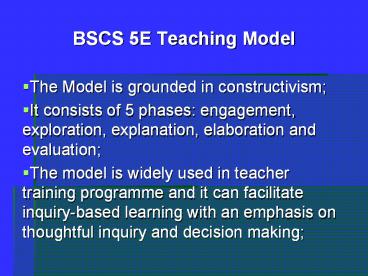BSCS 5E Teaching Model - PowerPoint PPT Presentation
1 / 28
Title:
BSCS 5E Teaching Model
Description:
BSCS 5E Teaching Model The Model is grounded in constructivism; It consists of 5 phases: engagement, exploration, explanation, elaboration and evaluation; – PowerPoint PPT presentation
Number of Views:590
Avg rating:3.0/5.0
Title: BSCS 5E Teaching Model
1
- BSCS 5E Teaching Model
- The Model is grounded in constructivism
- It consists of 5 phases engagement, exploration,
explanation, elaboration and evaluation - The model is widely used in teacher training
programme and it can facilitate inquiry-based
learning with an emphasis on thoughtful inquiry
and decision making
2
- BSCS 5E Teaching Model
- This inquiry approach is also believed to be
especially beneficial to gifted students who
would prefer a more autonomous inquiry way of
learning - The model has been used in the design of BSCS
(Biological Sciences Curriculum Study) curriculum
materials since the late 1980sand
3
- BSCS 5E Teaching Model
- there is research data supporting that BSCS 5E
Model may help enhancing students inquiry and
critical thinking skills as well as creativity.
4
BSCS 5E Model
- Engage
- Explore
- Explain
- Elaborate
- Evaluate
5
(No Transcript)
6
(No Transcript)
7
(No Transcript)
8
(No Transcript)
9
(No Transcript)
10
(No Transcript)
11
(Dr. Mark Salata)
12
Engagement
If we put the beads into the bottle of water, it
swells and we cannot distinguish them from the
water since its refractive index is very near to
that of water.
Do you observe anything special about the bottle?
13
1.Engagement
Ask students to predict what would happen if they
light 3 candles (tall, medium, short) at the same
time and then put a gas jar over them.
2. Exploration predicting, observing,
communicating, inferring, constructing
14
2. Exploration
15
2. Exploration
16
3. Explanation
Students are required to use mind maps to explain
what they observed in the candle experiment
17
Explanation
18
(No Transcript)
19
(No Transcript)
20
(No Transcript)
21
(No Transcript)
22
(No Transcript)
23
(No Transcript)
24
4. Elaboration
- Elaboration-predicting, forming hypothesis,
communicating - Student-applies concepts to a similar or new
context - Teacher-provides similar or new context to apply
ideas
25
4. Elaboration
- Trying to find evidence to support the hypothesis
- Carrying out further experiments
26
Students are required to design experiments to
further explore the candle experiment. They
may devise experiments to find evidence to
support their hypotheses. Through such new
experiences, they develop deeper and broader
understanding, more information and skills in
scientific investigations.
27
5. Evaluation
- Any unclear areas or questions which may have
developed? - Students are encouraged to assess their
understanding and abilities. - Teachers can evaluate students progress.
28
References
- http//www.bscs.org
- http//www.bscs.org/pdf/bscs5eexecsummary.pdf

